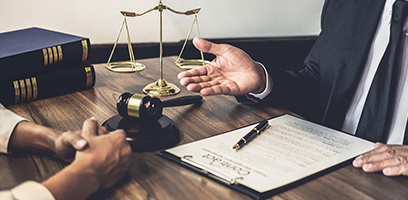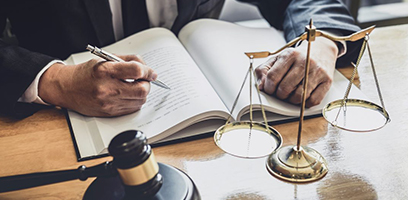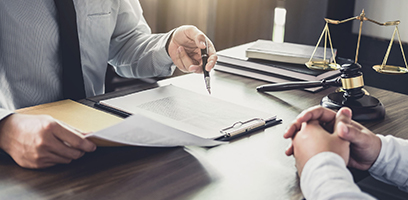-

How To Find A Lawyer?
No one ever plans on legal trouble, but sometimes it does happen. If the legal trouble is complicated or involves lots of money, you might not know how to deal with it without a lawyer.However, finding a good lawyer who can help you handle your particular problem may not be easy. Don't expect to locate a good lawyer by solely reading an advertisement. There is not enough information in this source for you to make a wise judgment. So how to find a good lawyer? Here are five effective ways to help you find a lawyer, as well as what questions you should ask during your first meeting with him or her to select the best one for your case. How To Find A Lawyer: 1. Personal Referrals Talk to your friends, family members, colleagues, and other acquaintances to see if they know any lawyer they can recommend. 2. Lawyer Referrals You can also ask a lawyer you trust. Even if they are not familiar with the area of law in which you need legal help, they may be able to recommend someone who can deal with your case. 3. Make Full Use Of Online Services Many sites offer a way to connect with your local lawyers. You just need to do a simple online search, answer a few questions about your case, and leave your contact information, then the right type of lawyers will contact you directly. 4. Consult Lawyer Directory Check your state or local bar association's attorney directory, which provides a list of lawyers in your area. 5. Turn To A Law Librarian A law librarian may help you identify authors in your state who have written articles or books on a particular legal subject. Try any or some of the methods mentioned above, and you’re sure to get some attorney options. But meanwhile, you may feel confused as to who will be the best attorney for your case. You need to interview each of them personally. Below are some of the important questions to ask: What Questions To Ask Before Hiring A Lawyer Do you offer a free consultation? If not, how much does the initial meeting cost? How much experience do you have in cases similar to mine, and what were the outcomes of those cases? Are there any other ways like mediation or arbitration to solve my problem? Have you ever been disciplined for attorney misconduct? What services do you provide? What are your fees? How are the fees calculated (by the hour, half-hour or otherwise)? Are your fees negotiable? How do you expect to be paid? How much time can you spare to solve my case? How often can I hear from you? More Considerations When Hiring A Lawyer Aside from asking questions, there are also many other things to consider: When you go for your consultation, pay attention to details, including how professionally you are treated, if his or her personality is compatible with your own, and if you feel comfortable working with him or her. Reading what previous clients have said about the attorney can also help you make the right choice.
Read More > -

9 FAQ About Legal Issues
What Is A Pro Bono Program? Pro bono programs help underprivileged people who cannot afford legal services seek volunteer lawyers to handle their cases for free or at a significantly reduced cost. State or local bar associations usually provide these programs. Attorneys in many fields offer pro bono services too. Who Is Entitled To A Free Lawyer? Individuals who are charged with a crime that might result in imprisonment and people who cannot pay an attorney can constitutionally get a free lawyer. Besides, those who are decided "indigent" by a court - having few assets and no funds to pay a lawyer - can get an appointed free lawyer. Who Else Qualifies For A Free Lawyer? One generally has no right to a free lawyer in non-criminal or "civil" cases. Fortunately, many community-based programs such as pro bono provide free legal services for people whose income is under 125% of the federal poverty level in civil cases. Besides, the elderly and disabled, domestic violence victims, and people enlisted in the military may be eligible for free legal help even with a little higher income. What Do I Do If I Can't Get Free Legal Help? If you are not eligible to get free legal services from a pro bono or legal aid program, you can turn to alternatives such as consulting a lawyer referral service for low-fee attorneys or seeking "unbundled" legal services to hire a lawyer for part of your legal work. You can also get legal information to solve the legal problem yourself. What Is The Legal Services Corporation? The Legal Services Corporation (LSC) is the single largest funder of civil legal aid in the US. It was founded to ensure that low-income Americans have equal access to justice by funding high-quality civil legal aid. What Is The Difference Between The Legal Services/Legal Aid Program And The Public Defender Program? A Legal service/legal aid program only handles civil cases, not criminal. The Public Defender Program offers free representation to people who cannot pay an attorney for criminal cases. When Should I Seek Legal Advice? Generally speaking, you should seek legal advice when you cannot settle a dispute, and your money or property is at risk of loss. Some common situations when you should get legal advice include: 1. You are threatened or sued with a lawsuit 2. You have a disagreement on legal documents 3. You need a divorce and want the custody of your children 4. You are abused by a family member 5. You think you are treated unfairly by a government agency What Kinds Of Cases Do The Legal Services Programs Handle? Each legal services program has its own priorities that determine which kinds of cases they can handle. Civil cases that most legal services programs can handle include family law, housing, consumer, public benefits, special education, unemployment compensation, tax problems, and others. What If A Legal Services Program Will Not Help Me? Due to limited resources and funding, legal services programs cannot handle every case for every person. If your case cannot be handled by legal services programs, you can turn to the Self Help Center for available resource materials. You can also contact the Legal HelpLink for a private lawyer.
Read More > -

Pros Of Local Attorneys
Lawyers, also known as attorneys, are advocates for both people and organizations to the court and to opposing parties. They are important in criminal cases, civil cases, and in situations that involve legal rights and obligations for personal and business issues. Do I Need A Lawyer? Online resources have provided knowledge people need to solve many of their legal issues. However, without the related education and proper training, the average person may easily miss a vital deadline or file the wrong document in court, which can crucially impact your legal rights. Lawyers or legal advisors have years of education and training on various aspects of the legal system. With that knowledge, they can help navigate you through any complex law-related process to ensure your legal rights are always protected. In addition, consulting a pro attorney or a legal advisor to get the right information quickly and accurately in a legal process can help save time and reduce costs. What Can A Lawyer Or A Legal Advisor Do For Me? First, a legal adviser helps clients avoid litigation. They advise how to prevent personal legal problems, or help non-profit organizations to establish and adhere to the requirements of their tax-exempt status. Second, a lawyer helps you decide whether you need legal help or not. Sometimes, it's hard to judge whether an issue is a legal matter or something that can be resolved out of the court. At this point, you can turn to a lawyer for initial answers. Third, a lawyer will represent you to the court and opposing parties in any legal matter. They prepare essential documents for you, offer advice on proceeding your legal issue, and speak for you on the court, or negotiate with the opposing party on your behalf on mediation or arbitration. Should Location Be A Major Factor In Your Search For An Attorney? Yes! Location is a significant factor you should consider when looking for an attorney to represent you. Here are three main advantages of hiring a local attorney: 1. A local lawyer understands the regulations for your location better. Your issue will likely depend on local laws, so a local attorney will be an ideal choice; 2. A local lawyer is more convenient for you to meet. Although some attorneys are willing to travel to meet you, they will mostly charge for travel time. Therefore, finding a local lawyer in your geographical area is usually a good idea; 3. A local lawyer has practical local knowledge. An attorney in a specific city or town will likely have connections to local agencies, which will be helpful in the process of resolving your issue. How To Find A Local Lawyer? The most common and reliable way is to ask your family, friends, or colleagues for recommendations. Even if the recommended lawyer cannot handle your case, he or she can likely introduce you to another attorney who can. If recommendations do not lead you to a right lawyer, consult your state bar association or local nonprofit groups for lawyer referral services. They can help connect you to a qualified lawyer. Some people also find attorneys through the phonebook from advertisements. However, you should be careful to review a lawyer's education and experience when selecting one this way. Finally, you can run an attorney search on the Internet. Many online directories can help you find plenty of lawyers in different practice areas.
Read More >
